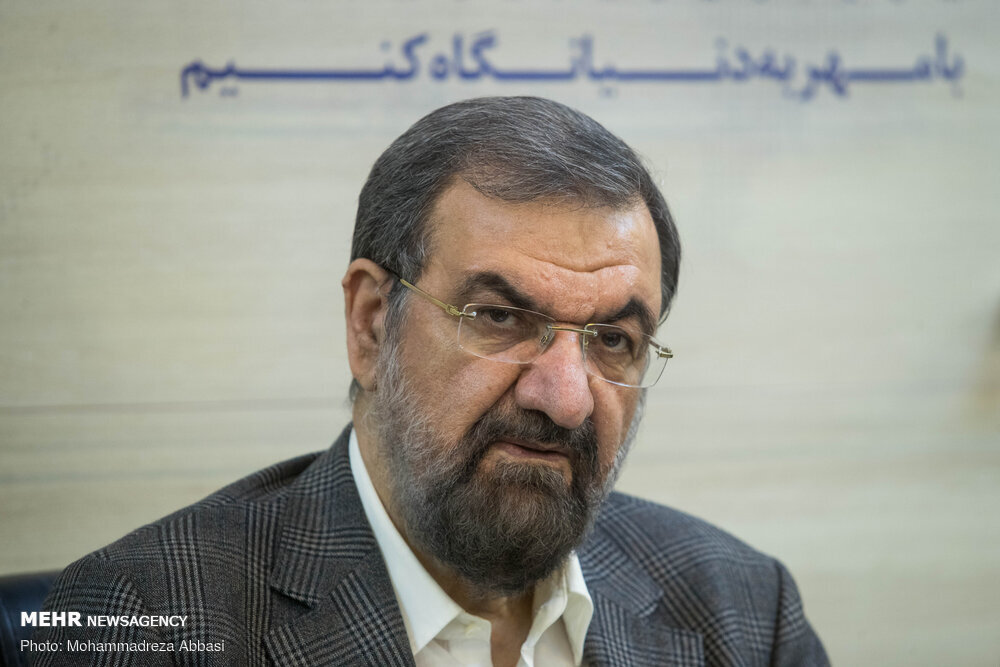Presidential candidate says Americans “should be compelled to make good on their commitments”

TEHRAN - Presidential hopeful Mohsen Rezaei has said he will not wait for a revival of the 2015 nuclear deal if he wins the presidential elections.
Instead, Rezaei says, his government will work to keep the country moving forward by activating national economy.
Talks are underway in Vienna, Austria, to restore the nuclear deal, officially known as the Joint Comprehensive Plan of Action (JCPOA).
So far, the remaining parties to the JCPOA – Iran, Britain, France, Germany, Russia and China – along with the United States have held five rounds of talks with the hope of restoring the nuclear deal. The next round is set to start next week.
Rezaei presented his views on a series of foreign policy issues ranging from the fate of the nuclear deal to ties with neighbors in an interview with English-language Press TV and Arabic-language Al-Alam news networks
The presidential election in Iran will be held on June 18. Some analysts argue that the election may go a second round if some principlist candidates don’t withdraw candidacy.
Rezaei, the current secretary of the Expediency Council, said the JCPOA was “an international commitment” and that his administration would “stick to the country’s international commitments.”
Former U.S. President Donald Trump abandoned the JCPOA in May 2018 in violation of UN Security Council Resolution 2231 that endorsed the multilateral agreement. Trump introduced the harshest sanctions in history against Iran under his “maximum pressure” campaign against the Islamic Republic.
Rezaei said Americans “should be compelled to make good on their commitments.”
The nuclear agreement was signed between Iran and the 5+1 group in July 2015. At the time Joe Biden, the current U.S. president, was acting as vice president under President Barack Obama. During presidential campaigns, Biden vowed to return to the nuclear deal if he wins the presidency. However, the Biden administration has so far refused to meet Iran’s demand for a practical and verifiable lifting of sanctions.
Rezaei said, “Although we will have the right diplomacy ahead of us, we will not be waiting for any agreement in Vienna.”
“By activating our national economy, we will try to be independent of having to have relations with the Americans…so that they would feel the more they waste time, the more they will lose,” said Rezaei. “We’ll start [boosting] our national production, and they are the ones who’d be following us.”
Iran remained fully loyal to the nuclear deal for a complete year after Trump quit the deal. At the time Iran said it is waiting for the remaining members of the JCPOA, especially European signatories to the JCPOA, to compensate Iran for the U.S. sanctions. However, seeing no tangible action by the European sides, Iran said its “strategic patience” is over and started to gradually reduce its commitment to the JCPOA.
Iran’s nuclear steps were in accordance to paragraph 36 of the JCPOA.
Paragraph 36 provided a mechanism to resolve disputes and allows one side, under certain circumstances, to stop complying with the deal if the other side is out of compliance.
Iran was insisting that if the Europeans compensate Iran for the sanctions, it will immediately reverse its decision.
Rezaei also said the Americans should know that Iran “will never go back to the unilateral, one-sided ties with the United States,” which existed prior to the 1979 Islamic Revolution.
“Our administration will welcome any relations that provide for national interests in practice, not on paper,” said Rezaei. “It’s [thus] in their interest to stop animosity. Antagonism will get nowhere.”
Neighbors are a priority”
Rezaei, the former chief of the Islamic Revolution Guards Corps, also said ties with neighbors would top his foreign policy priority if he wins the presidency.
“I take good neighborly ties seriously. There are certain challenges and differences of opinion in ties with some neighbors. I will try to calm things down,” the presidential candidate said in an open reference to the tension between Iran and Saudi Arabia and the United Arab Emirates.
“There are some differences of opinion. We need to look into them and resolve them. Our administration will be the frontrunner to resolve those issues,” Rezaei remarked. However, he added, it will depend on those countries’ willingness to repair their ties with the Islamic Republic.
‘Resistance saved Europe, U.S. from terrorism’
Elsewhere in his remarks, the former top military officer emphasized the importance of the resistance movement in the region, saying, “Had it not been for the axis of resistance, Iraq and Syria would have now been run by Daesh.”
Besides supporting the Palestinians against the Israeli occupation, the resistance front acts against terror and insecurity, Rezaei stated.
“It is in the interest of Europe and the U.S. to back the axis of resistance. They should not have unilateral relations with Israel,” Rezaei remarked. He advised the West to negotiate with the resistance front, which he said prevented terrorism from spreading to the entire world by defeating Daesh.
In his interview, Rezaei also said those Arab countries which normalized ties with the Israeli regime in fact made “a mistake”.
They committed “political suicide” and “stabbed themselves” in the back, he added.
The presidential candidate warned these countries to reverse their decisions and “compensate for their mistake” before Israel infiltrates into all layers of their ruling structures.
Under the so-called Abraham Accords, the UAE, Bahrain, Sudan and Morocco normalized ties with Israel in 2020. The Arabs and Muslims considered the move a betrayal of the Palestinians whose lands have been occupied by Israel.
PA/PA
Leave a Comment